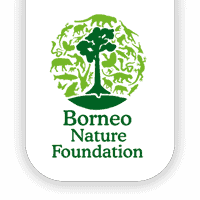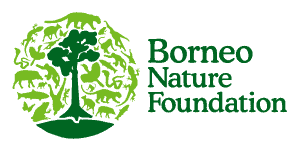On Tuesday 20th October 2020, Borneo Nature Foundation (BNF) Indonesia held a Basic Training session on Freshwater Fish Cultivation Techniques in Peatlands. The training session is an addition to the Community Nursery program held for the community groups in Kereng Bangkirai and Sabaru villages as an effort to enrich knowledge in the field of fisheries.
The training session was attended by 20 participants, including two lecturers of Fisheries at Palangka Raya University (UPR), Dr. Yulintine, S.Pi, M.Sc and Dr. Ir. Edison Harteman. The material provided focussed on the management of pond water for fish cultivation, and basic techniques for cultivating freshwater fish within peatlands.
Community Nursery Coordinator, Koesmiyadi, said that the event aims to provide a new understanding and increase knowledge about fish cultivation, especially freshwater fish. The biggest challenge we face is changing the mindset of fishermen towards modern fisheries such as freshwater fish farming.
“This is the initial stage. The two Community Nurseries are divided into 6 groups. Hopefully, each group will have their own fishpond. In addition, BNF also tries to provide solutions for the community in the economic field, “he said.
Yulintine explained that, for Central Kalimantan, the biggest challenge in peatlands is the very high pH of the water. This makes it difficult to build ponds with peat groundwater for fish to live, therefore proper water management must be carried out.

Yulintine added that you don’t need a large pool but a simple pool. It should be considered that the pond created must be able to return capital because cultivation must generate profits for the community. Everything starts with a simple step, which can then be slowly developed further.
Sabaru Community Nursery member M. Yanur said that he was happy with the fish farming training being held. He felt that the training provided by BNF was very useful for him and other members. With a small amount of capital, each group can create a simple freshwater fish farming pond, and the materials provided will also increase knowledge to manage the conditions needed for farmed fish.
“At first we didn’t understand how to do it, but now we understand better, then when we have the capital, we can build a simple pool out of tarpaulin on the land we have, such as in our yards. Currently, we understand 75% and will continue to learn so that our cultivation can be successful,” he said.
Yanur hopes that this cultivation will continue and slowly develop to improve the results obtained. For the time being, these new techniques are still being carried out in the demonstration plot provided by BNF, but in the future, it is hoped that each group or member can create their own pool to enhance the economy of the community, especially for the Community Nursery members.



